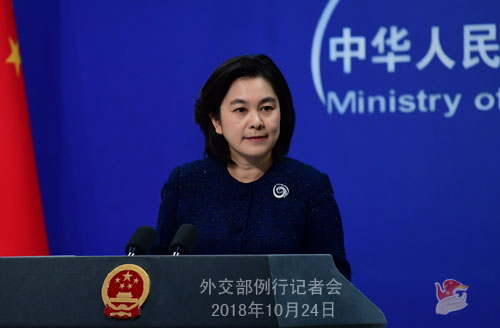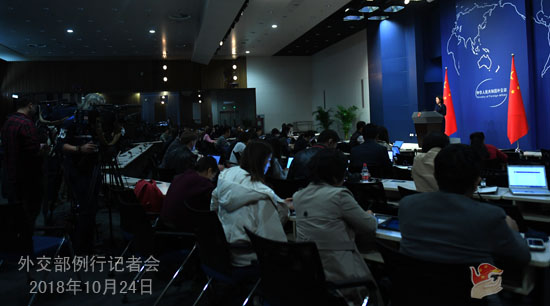
Q: According to reports, an official from Malaysia's International Trade and Industry Ministry recently stressed in an interview the importance of China's Belt and Road Initiative to China-Malaysia relations, saying that whether it is for the previous government or the present one, Malaysia always supports China's Belt and Road Initiative. What is your comment?
A: We commend these remarks made by the Malaysian side.
Malaysia is an important country along the ancient Maritime Silk Road. It is also among the first group of countries along the route that echoed the Belt and Road Initiative (BRI). When Prime Minister Mahathir visited China in August this year, he spoke highly of the BRI, saying that it will help promote regional exchanges and cooperation to serve the interests of all countries in the region. He made it clear that Malaysia supports the BRI and will continue to play an active part in it. In fact, China and Malaysia have signed MOUs on relevant cooperation. We will engage with each other and discuss formulation of guidelines to move forward relevant BRI cooperation so that more benefits could be delivered to people in the two countries and in the region.
Q: According to reports, Japanese Prime Minister Shinzo Abe, when giving an interview to the media, said that China's economic development represents a huge opportunity for Japan and the whole world and we should welcome that. Japan and China should maintain cooperation on strengthening the role of the WTO and the multilateral free trade system. What is your comment?
A: We have noted relevant reports. We welcome the positive statements made by Prime Minister Shinzo Abe.
This year marks the 40th anniversary of China's reform and opening-up. Over the past four decades, China has scored remarkable achievements in its development, which has not only made the Chinese people lead a better life, but also presented huge opportunities for Japan and other countries around the world and contributed to the peace and prosperity of the region and the world at large. This year marks the 40th anniversary of the inking of the China-Japan Treaty of Peace and Friendship as well as the 10th anniversary of the issuance of the China-Japan Joint Statement on All-round Promotion of Strategic Relationship of Mutual Benefit. The joint statement explicitly said that China and Japan are cooperative partners and not threats to each other. The two countries reaffirmed their support for each other's peaceful development. These principles are still highly relevant today. The two sides should build on past achievements, cement the political and legal basis for China-Japan ties, recognize the consensus that China and Japan are cooperative partners and map out the new blueprint for the future growth of our bilateral relations.
Presently, the world is challenged by unilateralism and the international rules and multilateral order are severely impacted. As two important countries in Asia and the second and third largest economies in the world, China and Japan shoulder important responsibility in opposing all forms of protectionism and unilateralism and upholding multilateralism and free trade. The two countries are duty-bound to strengthen communication and cooperation, jointly safeguard international rules and order and contribute to promoting world peace and development.
Q: We spoke to a person who once stayed in Xinjiang's vocational education center for four months and the families in Kazakhstan, who have relatives in Xinjiang. They said that the vocational centers are just like "jails" and now that they stay in vocational education and training institutions, why are they not free to come and go?
A: With regard to Xinjiang's efforts to fight terrorism, maintain stability and set up vocational education and training institutions, recently the Chairman of the Xinjiang Uygur Autonomous Region gave an interview to Xinhua News Agency and elaborated on the relevant situation. I would like to refer you to that.
As to the detailed information of the person you mentioned, frankly speaking, I am not aware of that. But I am wondering when you interviewed him. According to what you said, he once stayed in the vocational education center for four months. He claimed that the centers are just like jails and the people there have no freedom. If the people there really had no freedom just like he said, then how did he contact you and when and where did you meet and interview him?
I want to tell you that just a couple of days ago, China's Global Times published a very detailed article, which elaborated on its journalists' visit to Xinjiang's vocational education and training institutions. They spoke to many people there whose names and pictures were also published. I do not know whether you only believe this particular person you interviewed or you are also willing to believe the large number of people interviewed by the Chinese media?
You are a British journalist. The UK is also a victim of terrorism. Combating terrorism and extremism is a thorny issue facing all countries around the world. It is generally held by the international community that we should address both the symptoms and root causes and take multi-pronged measures to eliminate the breeding ground for terrorism and extremism. Over the years, many countries around the globe, including the UK, have been actively exploring the pathways to fight terrorism and extremism in light of their actual conditions. For instance, I once saw a report saying that the counter-terrorism strategy announced by the British government in June this year stressed the early intervention on people affected by extremism. In 2016, France announced that it would set up de-extremism centers in its 12 provinces to help its citizens affected by extremism return to normal life. The United States is trying to remold the youngsters affected by extremism with community corrections. The relevant practices in China are no different from those in the UK, France and the US. They are all the active efforts we have made to prevent terrorism and eliminate extremism with the view to nipping the evil in the bud, curing the "sickness" and saving people, doing our best to safeguard people's basic human rights, including their right to life and development and protecting them from terrorism and extremism. This also represents the duties and obligations of one country's government to its people.
We oppose double standards on counter-terrorism. We hope that friends from the media can refrain from listening to the one-sided story and view the efforts made by other countries to effectively prevent terrorism and fight extremism in accordance with the law in an objective way.
I also want to tell you that China is a country under the rule of law and the Chinese government protects the legitimate rights and security of its citizens and the foreigners in China in accordance with the law. As friendly neighbors, China and Kazakhstan maintain smooth communication on the issues related to the personnel exchanges between our two sides.

Q: Starting from November 4, the US requires other countries to stop buying oil from Iran to conform to its sanctions. Will China continue to buy oil from Iran and what is China's strategy in this area?
A: Actually the question you raised boils down to whether we should continue to implement the Joint Comprehensive Plan of Action (JCPOA). China's position in this regard has been made very clear.
Firstly, China always opposes the unilateral sanction and long-arm jurisdiction. China's normal cooperation with Iran under the framework of the international law is reasonable, legitimate and legal and it should be respected and upheld.
Secondly, you may have noted that in September this year, the existing participants of the JCPOA held a foreign ministers' meeting in New York and released a joint statement. The relevant parties recognized that ensuring Iran to get economic dividends is an important part of the JCPOA. The Chinese side welcomes the practical solution that can maintain normal economic and trade cooperation with Iran and uphold the effectiveness of the JCPOA, the international non-proliferation regime, the peace and stability in the Middle East, and multilateralism and international rules.
China, the EU and other relevant parties will make utmost efforts to safeguard our respective legitimate and legal rights and interests.
Q: The French newspaper Le Figaro said it acquired a document showing that China got in touch with more than 4,000 officials and workers serving in the French public sectors through LinkedIn and other social media and very efficiently stole large amounts of core sensitive data from the French government and companies. What is your response?
A: Recently, we have been hearing all kinds of groundless accusations against China which are wrapped in different packaging. This report is no exception.
Cyber security is a global issue. Cyberspace is a complicated virtual world where the interests of all parties are intertwined. It calls for constructive efforts from the international community, including from governments, relevant industries, think tanks and media. It needs no baseless fabrications and accusations.
I want to reiterate that China firmly opposes and cracks down on all forms of cyber theft. We would like to work with all parties to build a cyberspace of peace, security, openness and cooperation based on mutual respect and mutual trust.
Q: Japanese Prime Minister Shinzo Abe will start his official visit to China. What specific outcomes does the Chinese side expect to achieve through this visit?
A: Prime Minister Shinzo Abe will kick off his official visit to China tomorrow. It is the first visit to China by a Japanese Prime Minister after a lapse of seven years at a crucial juncture marking the 40th anniversary of the signing of the China-Japan Treaty of Peace and Friendship. We hope that during this visit, Prime Minister Shinzo Abe will exchange views on the improvement and development of China-Japan relations and international and regional issues of mutual interest with the Chinese leaders. We have said that the two sides will also host a reception commemorating the 40th anniversary of the inking of the China-Japan Treaty of Peace and Friendship and the First China-Japan Third-Market Cooperation Forum.
We hope that at this crucial juncture, the two sides can build on past achievements, reaffirm the consensus that we are cooperative partners instead of opponents and that we view each other as opportunities rather than challenges, and make concerted efforts to improve and develop bilateral ties and deepen mutually beneficial cooperation in various areas.
Regarding the specific outcomes, we will elaborate on that after Prime Minister Shinzo Abe wraps up his visit. We are willing to work with Japan to ensure the success of this visit.
Q: Britain's First Sea Lord Admiral Sir Philip Jones said in an interview with the Financial Times that Britain will assert its right to freedom of navigation in the South China Sea despite recent Chinese claims of provocation. He implied that some country has a different interpretation of the United Nations Convention on the Law of the Sea (UNCLOS) to the majority of nations. He also said that Britain had an obligation to showcase "physical support" for its allies in the Asia Pacific region and to resist China's flouting of international conventions on the laws of the sea. What is your comment?
A: We have noted relevant reports. We must express our grave concern and firm opposition to the UK's statements quoted by the relevant reports. As we all know, the situation in the South China Sea has been improving and is stable at this point. Both China and ASEAN countries have a strong will to maintain peace and stability in the South China Sea and are taking concrete actions to achieve that. Everyone knows clearly that there are still some countries that are reluctant to accept a calm and tranquil South China Sea and have been trying to stir up troubles and create high wind and rough waves in the South China Sea. This British official you cited said that some country has a different interpretation of UNCLOS to the majority of nations. However, can the UK claim itself to be the representative of the majority of the international community? China signed onto UNCLOS when it first opened up for signing. Since then, China has been abiding by it every step of the way, unlike one of those allies the British side mentioned who has yet to ratify the Convention and is still not an official member of UNCLOS. I believe that the British side should have resisted what its ally has done, instead of picking sides and choosing to stand with its ally.
I also want to add that freedom of navigation in the South China Sea has never encountered any problem. Over these years, those who have been concerning themselves with the issue of navigation freedom in the South China Sea have failed to produce a single piece of evidence to prove the existence of any problem. Therefore, the so-called issue of navigation freedom is non-existent. Any move that aims to force or threaten others to accept one's unilateral interpretation of international law under the pretext of navigation freedom is violating international law and international norms.
I would like to remind the British side that the recent trespassing by their HMS Albion into China's territorial waters off the Xisha Qundao has already inflicted damages on China-UK relations. We strongly urge the UK to treat China's concerns seriously and stop such provocative actions.
Q: White House economic adviser Larry Kudlow said in an interview that President Trump and President Xi Jinping will hold a bilateral meeting on the sidelines of the G20 Summit. What is your comment?
A: I have no information on that. You know that China and the US maintain communication on dialogues and exchanges of all levels.





